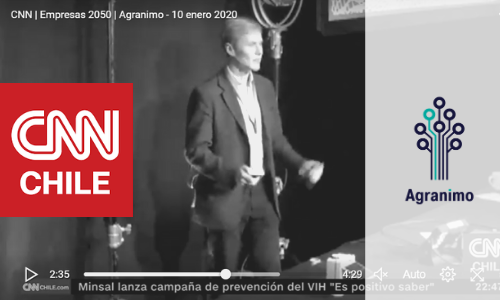Agranimo featured in CNN Chile
“How can agriculture adapt to climate change through technology?
Global warming is a reality that is becoming more and more evident, what is not so clear is how to change to help deal with this phenomenon effectively and quickly. Agranimo is a Russian-Chilean initiative that has found what seemed unattainable, a formula that rationalises crops through real-time monitoring.”- CNN Chile.
We are very excited to be featured in the CNN Chile programme that focused on the companies rooting for sustainable changes and raises very important questions: How can companies cope with the effects of climate change? What are the practical solutions available to mitigate the effects and forecast the risks?
It is the music of water, fresh and abundant, typical of other times. Since 1912 the boat of the German Fountain has been sailing on an imaginary sea in the Forest Park. We are in 2019 and this has been transformed into a river of water wasted in the midst of the drought that is advancing in the country’s cities and also in the countryside.
It is here that the consequences of climate change are felt more strongly than ever, with a mega-drought that has already been going on for 10 years with a 30 percent deficit in rainfall between Coquimbo and La Araucanía. As in Isla de Maipo, where despite everything they still resist the changes.
«It’s always been an old-fashioned view. The person responsible for irrigation has been doing irrigation and it is difficult to give him another task» says Camilo Hernández in charge of Viña Terramater
However, adaptation is urgent. And the challenges are not just for jobs, but for the entire agricultural sector.
«The same paradigm has already changed in recent years and no longer seeks to maximize production only, but also to do it in the best possible way, to do it as efficiently as possible, and that is where technology comes in. If, for example, with the litres of water you have an efficiency of only three litres of water from ten to the plant, you are capable of taking that to nine with technology,» says Adolfo Donoso, scientific director at Agranimo.
How to do it? To help answer that question Agranimo was created. A Russian-Chilean startup dedicated to rationalizing agriculture through real-time monitoring of climate factors affecting crops.
«The technology we have developed consists of two parts. First – is a one-meter moisture probe, which has four levels of soil measurement. And what it does is, it is installed in a one-meter hole made with the drill and then it communicates, when there is the internet, everything to the cloud and to the platform, through this small station, which also works as a black box, and as climate sensors. This climate information is what allows us to do everything there is: the alerts, alarms, and development with artificial intelligence. While the sensor is what allows us to have a water status of the orchard,» explains Donoso.
Currently, Agránimo provides services in Chile to more than 30 producers of apples, cherries, avocados, walnuts, hazelnuts, blueberries and olives. And it works outside the country with research centres in Puerto Rico, Germany and Russia. Its creators started out concerned with more efficient irrigation, but have expanded their work to what they call microclimate analysis.
“The farmer’s job is to see how the climate, the environment changes and do something to give the plant better conditions, anything to make the plant grow and have better results,” says Nikita Gulin, co-founder of Agranimo.
And the scope of this application is not limited to fieldwork. They are now considering extending their services to distributors of agricultural products, eventually, to the whole world. The idea is that those who buy from outside will know what product to expect.
«Every supermarket in China, in Germany, anywhere in the world that buys, has to worry about the microclimate of a field that is in Maule, for example. That is why we realized that with this analysis we can share this microclimate emergency with all the participants of the chain and thus share a little bit of the cost of the whole system. Because everyone gets the value from this and the cost has to be shared as well. Not only the farmer pays, but the whole chain pays – the logistics company, the supermarket, the importer, exporter, all the participants. This is our vision for the fruit industry in general,» says Gulin.
There are many plans and little time left. The climatic emergency is advancing and more and more scenes like these will be only the memory of times when it could still be wasted.


